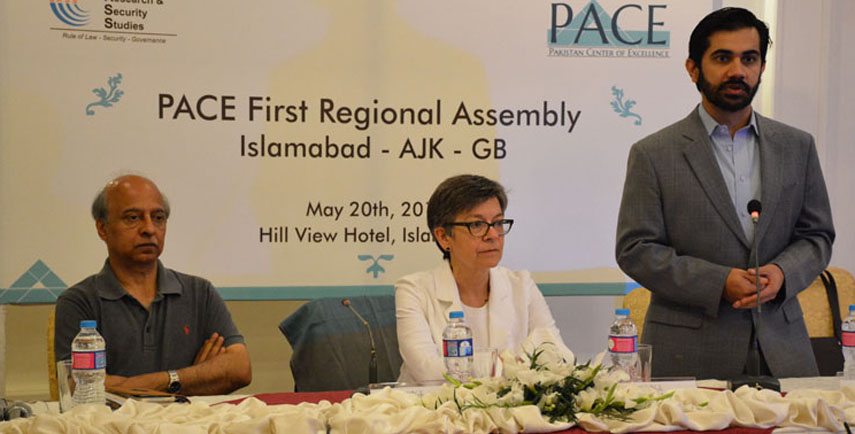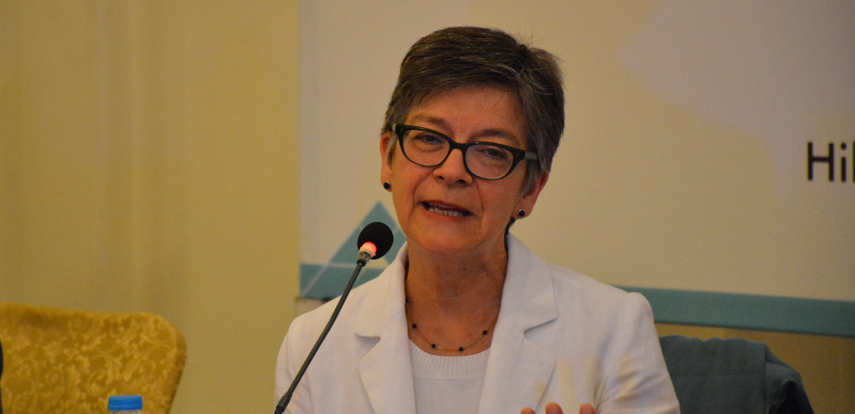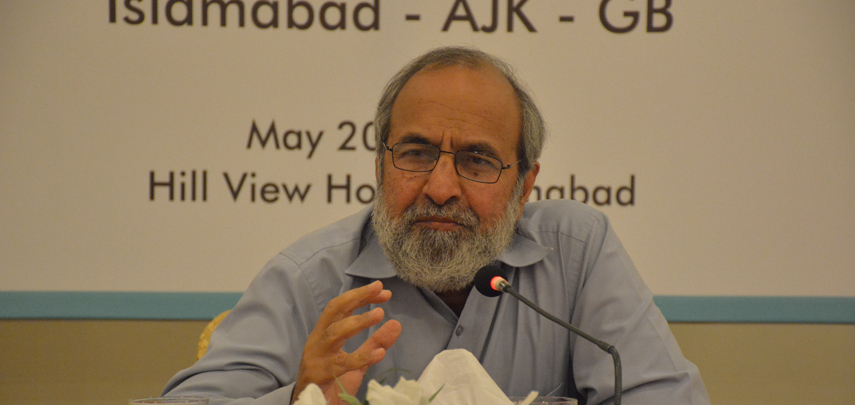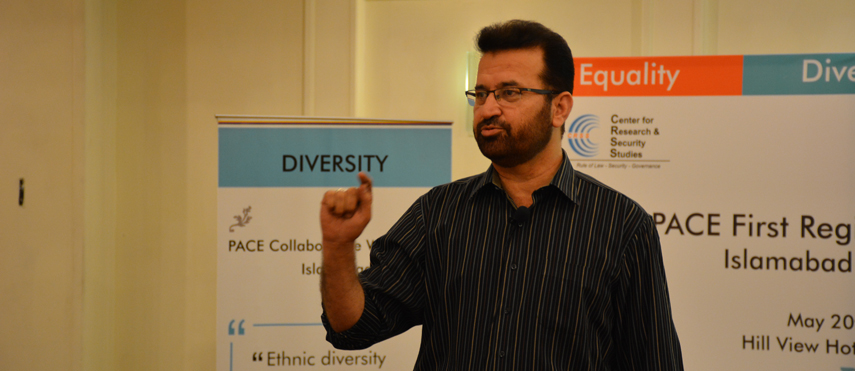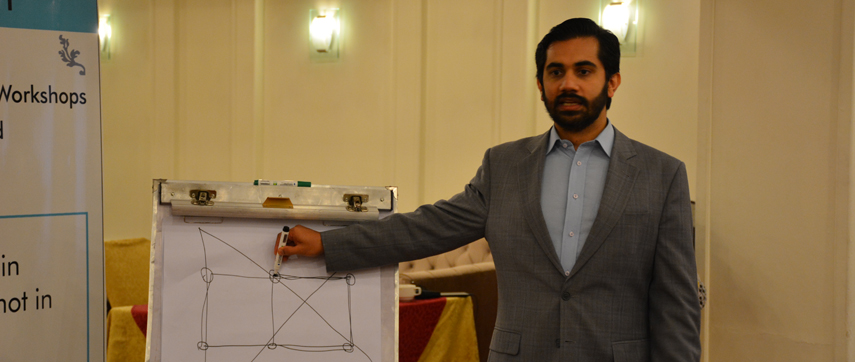EXECUTIVE SUMMARY
The Center for Research and Security Studies (CRSS) conducted the first PACE Regional Assembly on May 20, 2017, at Hill View Hotel, Islamabad for young university lecturers and professors who were past participants of PACE Collaborative Workshops. The assembly covered the regions of Islamabad, Azad Jammu and Kashmir, and Gilgit Baltistan.
The objective of the regional gathering was to reinforce the themes that were discussed during the past workshops and to learn from the experiences of speakers and participants in the current climate and volatility of Pakistan. The workshop was conducted under the umbrella of the Pakistan Center of Excellence (PACE), a counter-radicalization and pluralistic values focused project, in collaboration with the Dutch Government. Participants included young university lecturers and professors from three regions of Pakistan (Islamabad, Azad Jammu and Kashmir, and Gilgit Baltistan).
Experts from various fields including, Dr. Khalid Zaheer, Mr. Safiullah Gul and Mr. Zeeshan Salahuddin discussed a range of new topics with participants.
INTRODUCTION TO CRSS
CRSS is Pakistan’s first think-tank of its kind founded by civil society activists, committed to the cause of independent research and nonpartisan analysis to help people in and outside Pakistan better understand this nation of 180 million. The Center aims to contribute in building a Pakistan where every citizen has the opportunity to progress as far as his or her talent can take him or her. We believe in, and promote good governance, rule of law, accountability, and independent judiciary ´ elements that are fundamental to the country’s political and economic progress. Center for Research and Security Studies (CRSS) strives for a democratic Pakistan where all inhabitants are acknowledged as equal citizens without any racial, ideological, ethnic, religious, or sectarian discrimination.
INTRODUCTION TO PACE
Pakistan Center of Excellence (PACE) is a major CVE initiative by the Center for Research and Security Studies (CRSS) designed to trigger critical thinking through a discourse anchored in fundamental global values such as socio-political diversity, acceptance of diversity, rule of law and equal citizenry, as well as the rights afforded within Pakistan’s Constitution (articles 8-28). This landmark project is running with the support of the government of Netherlands.
PROCEEDING
The Center for Research and Security Studies (CRSS) conducted the first one day PACE Regional Assembly on May 20th, 2017, at Hill View Hotel, Islamabad for young university lecturers and professors who were past participants of PACE Collaborative Workshops. The first regional assembly covered the regions of Islamabad, Azad Jammu & Kashmir, and Gilgit Baltistan.
Participants included young lecturers and professors from Bahria University, Islamabad; COMSATS Virtual Campus, Islamabad; Quid–e-Azam University, Islamabad; National Defense University, Islamabad; International Islamic University, Islamabad; Preston University, Islamabad; Pakistan Institute of Development Economics, Islamabad; University of Lahore, Islamabad Campus; The University of Azad Jammu and Kashmir, Muzaffarabad; Department Of Technical And Vocational Education, Muzaffarabad; University of Poonch, Rawalakot; Women University of AJK and Bagh, Bagh; Karakoram International University, Gilgit Baltistan; and COMSATS, Islamabad Campus.
Dr. Khalid Zaheer shared his experience and knowledge on how to end religious differences and promote religious tolerance. Mr. Safiullah Gul, a suicide attack survivor and Bureau Chief at Dunia News, Peshawar extended his views on communication skills and mr. Zeeshan Salahuddin shared his views on conflict management.
OPENING CEREMONY
Mr. Zeeshan Salahuddin, Project Manager, welcoming the participants to the regional assembly said that PACE workshops gather a diverse group of university teachers from all across Pakistan every month to pull together a wide spectrum of ideas. CRSS, after conducting 17 successful PACE Collaborative Workshops, now started conducting regional assemblies. He shared that purpose of these assembly is to re-engage with past participants and reinforce the ideas previously discussed. Second idea is to get a little bit deeper into the topics that we are discussing for the first time. Furthermore, these assemblies are to get feedback on the idea of implementation of practicum activities. He said that we would love to have participants share their valuable feedback on the challenges they are facing in their universities and society while implementing the ideas of equality, diversity and tolerance and what were the learnings.
Her Excellency Margaret Adamson, the High Commissioner of Australia to Pakistan was the chief guest during the opening ceremony of PACE’s first regional assembly, on Saturday, May 20, 2017. The High Commissioner shared her views saying that she had the opportunity to visit many parts of Pakistan. She said that some of the places that I was really delighted to visit were Gilgit Baltistan and Muzaffarabad, AJK. In Muzaffarabad, there are a few rural projects that Australian Government is supporting. Through visiting these areas, you get to know about the distinctive characteristics of people and cultures.
She stimulated the discussion saying that you all are invited here because you are taking interest and playing an important role in shaping a more tolerant society. It is really a great privilege to share about Australia’s experience of multiculturalism. In Australia, when the term multiculturalism started to be used, there was a sense of rejection. People believed we are meant to be known as Australians, It is going to challenge integration and the concept of unified nation. The counter argument is that we are diverse, we were already diverse when we started welcoming the people coming from outside, but the idea of the pluralism was not that strong or acceptable at that time.
We are diverse and yet we are together. She shared that one half of our population is either born overseas or has a parent born overseas. These days we have different and diverse cultures, ethnicities and religions in Australia. People from every corner of the world have come to get settled in Australia. My Prime Minister believes in mutual respect for each other and shared values. We believe in fair go for everyone; fair go for people living with disabilities, fair go for women and a fair go for people with different sexual orientation. When I was a kid, Australia was a pretty bland place, it was diverse but it was as we actually had not emerged into a recognized pluralistic society. Now, Australia is known as one of the multicultural and respectful society for everyone.
Sharing her views on the pluralistic values, the High Commissioner said that every culture has their own food, festivals, traditional attires and we enjoy everything that multiculturalism has brought to us. But when there is a sense of sharing and course for celebration, then there are festivals that are celebrated by all. There are private festivals celebrated by specific groups and that are also respected equally and some are celebrated publically at a larger scale.
Rule of law, in Australia, supports what we are talking about here; diversity and equality. Anti-discrimination legislation is one of them to protect people from biases and prejudices. In Australia, we have a very strong version of law that restricts hateful speech. Yes, we have a freedom of speech but we also have a responsibility not to wound others with our words. That is imperative and needs to be considered when you are in a society that consists of people from every kind of backgrounds.
Concluding the session, the High Commissioner said that we need firm legislation to curb hate speech. We need to educate our people continuously. It is a difficult task but with mutual cooperation and collaboration we can work against discrimination and biases.
Dr. Khalid Zaheer: Ending differences
Dr. Khalid Zaheer kicked off his session on the topic of “Ending Differences”. He started his session with a note that he kind of disagree with the topic. He believes that the ideal is not ending differences but to understand and tolerate them. The purpose is to be able to communicate with each other despite those differences. I am saying it so because I believe that God also doesn’t believe in ending differences. He referred to a verse from Holy Quran, “Here it been your God’s will, He would have made all humans belong to one religion but He didn’t desire that. So, you will find them continuing to disagree”. He continued saying that if God has willed something, how can you unwill or undo it. Honestly, it is not the ultimate ideal that all humans should have one religious point of view or one sect. That is neither workable nor desirable. The reason is that God has created humans for the purpose of trial and for that purpose he has given us freedom. We are all free agents; we have different backgrounds, personalities and different set of circumstances. Therefore, we have different ideas and point of views.
He said that God wants someone to be born to a certain family or place and it is obvious that person will have the background of his parents and everyone has a same story. Then, in a society, people come together despite of all those differences and respect each other. In this process, we continue to accept what is right coming from others and reject what is wrong which belongs to me and my background. He enthused that had there been no differences; the purpose of life would have been lost. So, God has desired that this difference of opinion should continue. Our struggle for search of truth can only be tested if we have difference of opinion. Because God wanted to test me, my honesty, my commitment to truth, therefore, he caused me to be born in a family which has a certain religious point of view. Then, He made me grow and mature into a human who has thinking mind. We, then are able to talk to each other and find out what truth is? God wanted this test to be a genuine test.
Dr. Zaheer through an imagination activity asked participants to think of a society with no differences. Second thing can be that there was no freedom of choice for anyone and all were forced into a single set of beliefs. Third option can be that you have a particularly strict dictatorial regime in which you are supposed to follow the same belief system that is followed by majority. Fourth condition could be that there were no differences at all. He negated all these ideas and said that in all these scenarios, people would have been forced into one thing. There would have been no thinking process. But God doesn’t will that; we all have a thinking mind and intellect and we are supposed to follow what we believe is truth and just.
Therefore, the only way out is to allow differences to be there and to create an environment where we understand each other. We communicate with each other properly and respect. The purpose of respecting differences is that the other person believes in what he thinks is right. Every person should accept truth when it comes their way. No one has a right to impose their beliefs on others. We don’t have a right to brainwash anyone. We are expected from God to embrace and accept the truth but it’s not something that one individual can force it down the throat of others.
Religious tolerance is the right one should give to others to believe in and practice faith of their choice. We can’t impose our views on others and we can’t blame others for their beliefs and ideas. You can’t respect a view despite of strongly disagreeing with it but you can show tolerance towards it. When we say, we allow other to have religious freedom and we can’t impose our point on other genuinely, that is called religious tolerance. We have no right to impose our beliefs on others. Our attitude toward others beliefs should be genuine and positive.
Mr. Safiullah Gul: Communication Skills
Mr. Safiullah Gul started his session on “Communication Skills”. He shared the essential factors for good communication as self-confidence, tone of the communicator, being respectful towards others, eye-contact, switch between the topics when necessary, proper selection of words, clarity and concision, empathy, and open-mindedness. He also talked about the methods of non-verbal communication. He elaborated these methods as gestures, body language and posture, eye gaze, appearance and symbols. He shared that most part of our messages are conveyed through the non-verbal dimension. We tend to put a lot of effort in our verbal content and almost completely ignore our body language.
He elaborated the barriers to good communication as:
- Use of unfamiliar and technical terms
- Distractions
- Difference of opinions
- Physical disabilities and language differences
- Cultural differences
Mr. Zeeshan Salahuddin: Conflict Management
Mr. Zeeshan Salahuddin started off his session with definition of conflict as, “the expression of disagreement over something important to any (can be more than two) sides of a dispute that comes out of a perceived or real threat”. He shared that conflict arises when there are people involved with difference of opinion and reactions. It can arise even at your home, university, neighborhood, city, and country. Some conflicts are of global and international levels. To avoid the violent form of conflict, he referred to a quote by Max Lucado, “conflict is inevitable, but violence is optional”. He said that violence can never be a solution to any conflict or disagreement.
He insisted on the identification of the root cause of the conflict putting aside the emotions and sentiments. Conflict can be resolved if you try to bring out the facts and deal with them accordingly. He shared that conflicts or disagreements can arise when there is conflict of interest. The conflict of interest can be either people are struggling for the same resources such as a job or property. It sometimes can be the bad governance that can make people annoyed and enraged. Conflict can be political or religious too if there is a clash between the belief system. Ethnic differences can also lead to a conflict as people love to stick to their ethnic identity.
Moving on to the measures needed for the solution of a conflict, he said that you can only solve a problem if you are willing to listen to each other. You can never resolve a matter unless you come out of the thought that you are right and the other person is wrong. Conflict resolution can involve the steps like:
- Ask questions
- Analyze expectations
- Foster diverse perspectives
- Identify mistakes
- Avoid emotional triggers
Mr. Salahuddin also talked about the intuitive and systematic modes of thinking. He presented a comparative analysis of both thinking modes that how can they be helpful to avoid or resolve a conflict.
He concluded the session saying that human beings are bound to live together yet there would be disagreement or conflict. These conflict can only be resolved if we think sensibly and reasonably. We have to co-exist and it can only be possible if we constantly try to avoid conflicts through positive attitude.
Closing Ceremony
Mr. Zeeshan Salahuddin, is his closing remarks said that the objective of the regional assemblies is to recall the PACE themes and to create a critical mass of young leaders equipped with the skills to critically analyze issues, look at each other as equal citizens, and correct misconceptions about marginalized communities.
He said that we wish to have a more tolerant and respectful society that believes in equality and diversity. A society that respects everyone without any discrimination of religion, ethnicity, language or physical attributes.

